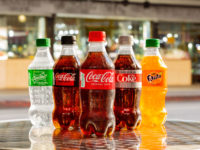The Coca-Cola Co. marks 130th anniversary with philanthropic efforts in Atlanta
Georgia Historical Society unveils marker where first Coca-Cola was served

Atlanta-based The Coca-Cola Co. and its global philanthropic arm The Coca-Cola Foundation announced that they are pouring money into improvements throughout the city's Centennial Olympic Park District. Coca-Cola Chairman and Chief Executive Officer Muhtar Kent announced the gift alongside Atlanta Mayor Kasim Reed at a celebration hosted at the intersection of Peachtree and Marietta streets, where the first Coca-Cola was served 130 years ago on May 8, 1886, the company says.
"There is no better way to celebrate 130 years of Coca-Cola than to give back to our hometown," Kent said in a statement. "While Atlanta has always been and will always be Coca-Cola's home, the Centennial Olympic Park District is our neighborhood. For decades, we have continued to invest in improving the area around our headquarters to support the continued growth of tourism, business and residences right here in our backyard."
Given by The Coca-Cola Foundation, the grants will provide support for five organizations in the Centennial Olympic Park District, including:
- $1 million to the Georgia World Congress Center Authority to support the expansion of green space and updates to facilities within Centennial Olympic Park;
- $500,000 to the PATH Foundation to support efforts to connect Centennial Olympic Park to Atlanta's west side neighborhoods, including efforts to reconfigure Ivan Allen Boulevard with new bike and pedestrian trails and improved landscaping;
- $250,000 to The National Center for Civil and Human Rights to support Operation Inspiration, an access program that underwrites admission fees for students attending Title 1 schools in metro Atlanta;
- $50,000 to the Atlanta Union Mission to empower women living at My Sister's House with vocational training and life stabilization skills;
- and $30,000 to the Children's Museum of Atlanta to support new exhibits opening in 2016.
Atlanta Mayor Reed said: "Since Coca-Cola's birth here at Five Points in 1886, the company has been committed to strengthening our city's core as a major employer, driver of tourism and contributor to transformational initiatives like the development of the Centennial Olympic Park District. Coca-Cola's commitment today to further improve the quality of life in downtown is the latest example of the vibrant private-public partnership we continue to enjoy.
"I often say there is no better global ambassador for Atlanta than Coca-Cola," Reed continued. "Our city had the privilege of loving Coca-Cola first and we are immensely proud of the work the company continues to do to make our hometown and our world a better place."
Since its inception in the early 1990s, Centennial Olympic Park has become a major tourist hub for downtown Atlanta with more than three million people visiting the area each year, according to the company. “Pemberton Place,” directly north of the park, was developed by Coca-Cola utilizing land purchased to house the company's Olympic City during the 1996 Olympic Games, in combination with land acquired by the company after the Games, it says. In addition to building a new World of Coca-Cola, Coca-Cola donated the land for both the Georgia Aquarium and the National Center for Civil and Human Rights to create a hub for three of Atlanta's major tourist attractions at Pemberton Place, it adds.
Over the past decade, The Coca-Cola Co. and The Coca-Cola Foundation have invested more than $160 million and tens of thousands of volunteer hours in support of social, economic and environmental programs throughout Atlanta, the company says.
New historical marker
Mayor Reed and The Coca-Cola Co.’s Kent also were joined by representatives from the Georgia Historical Society, who dedicated a new historical marker at the "Five Points" intersection, which marks the site of Coca-Cola's first pour, the company says.
"The Georgia Historical Society is honored to commemorate the birthplace of Coca-Cola with a Georgia historical marker," said Todd Groce, Georgia Historical Society president and chief executive officer. "Honoring Coca-Cola as part of the Georgia Business History initiative ensures that current and future generations will not only understand the importance of this intersection as the birthplace of one of the world's most successful and recognizable brands, but also the importance of this iconic Georgia company as a key driver in our state's development and growth for the past 130 years."
The text of the marker reads:
"The first glass of Coca-Cola was sold for five cents on May 8, 1886, at Jacobs' Pharmacy, a popular Atlanta soda fountain that was located on this corner. Coca-Cola was created by Atlanta pharmacist John Pemberton in his laboratory just a short walk from this location. Atlanta businessman Asa Candler began to purchase the rights to the formula for Coca-Cola in 1888 and founded The Coca-Cola Company in 1892 as a Georgia corporation to manufacture and advertise Coca-Cola across the country. Candler sold the company in 1919 for $25 million to a group of investors that included Ernest Woodruff. His son, Robert Woodruff, led Coca-Cola for more than half of the twentieth century, expanding Coca-Cola into a global business. Today Coca-Cola is the most widely recognized consumer product in the world."
Coca-Cola's global operations have been based in downtown Atlanta since the beverage was created in Pemberton's home on Marietta Street in 1886 and carried to Jacobs' Pharmacy to be served to the first consumers, the company says. After outgrowing a series of offices stretching from Edgewood Avenue to Decatur Street, The Coca-Cola Co. established its current headquarters site on North Avenue in 1920. Today, more than 5,000 people work at the North Avenue headquarters campus with 4,000 additional Coca-Cola associates based throughout Georgia, it adds.
In addition to the dedication event, the company said thank you to downtown residents and workers by handing out thousands of free beverages in Woodruff Park as well as tickets for free admission to the World of Coca-Cola museum.
"We are grateful to the millions of people who have supported and enjoyed our brands in our hometown and around the world over the years," Kent added. "It is because of them that we are able to stand at this historic site today."
Looking for a reprint of this article?
From high-res PDFs to custom plaques, order your copy today!








